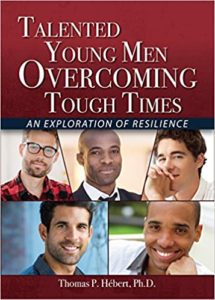Talented Young Men Overcoming Tough Times
Talented Young Men Overcoming Tough Times: An Exploration of Resilience.
By Thomas P. Hébert, PhD
(Prufrock Press, 2018 – Learn more)

Dr. Thomas P. Hébert explores the concept and source of resilience in his book Talented Young Men Overcoming Tough Times: An Exploration of Resilience, by closely examining the lives of five young men.
Dr. Hébert asked, What enabled these talented young men to overcome the adversity, and what were the factors that influenced the emergence and sustainability of their resilience? He looked at several significant themes that he saw among the five men.

Dr. Hébert found that it was the teachers who not only addressed emotional well-being in these young men, but other areas of development, that left the greatest mark. They directed their students to extracurricular activities and programs that would nurture these strengths.
They also served as personal cheerleaders when these then-teenagers competed in academic and athletic domains. Each young man in this book tells a story of a remarkable teacher and how that teacher helped them to succeed.
Reaching beyond school hours
Dr. Hébert also found that it was important that these young men developed talents through extracurricular activities and athletics. These activities were tangible products or performances that built a sense of accomplishment and success.
The men in this book also described how these activities were outlets for managing stress in their life. When they were faced with difficult challenges at home or in their personal lives, they could take their minds off of their situations, focus their energy on something positive, and direct their energy in meaningful productivity. It was a way to avoid depression and set aside their immediate problems as they focused on the task at hand.
They felt successful when they were in an activity that they enjoyed. The success provided them with positive emotional feelings that allowed them to fill the “emotional gas tanks” that fueled their resilience. These activities also gave them exposure to the outside world and a life that they could have in the future.
Students’ perseverance
However, Dr. Hébert found that it was not only the support they found in an academic environment that helped these young men, but personal characteristics. Dr. Hébert found that each of these men had strong perseverance. They constantly focused on the future. Practical intelligence was also something that contributed to their survival and success. The men showed “grit.”
Another researcher, Angela Duckworth, explained this as, “about working on some things you care about so much that you’re willing to stay loyal to it… it’s doing what you love, but not just falling in love – staying in love.”
Keith’s struggle
All of the stories are unique to the young men. I am going to take a close look at one of them, Keith. Keith’s story is about a talented young man who faced poverty. He was misunderstood and neglected, was bullied in school and confronted family dysfunction throughout his adolescence before reaching professional success as a university professor. Keith’s story, in part, is a thank you letter to his teachers.
He describes visually the little things that his first and second grade teachers did to make his classroom special and how each teacher was different. It was especially important when he met his first male math teacher in the fifth grade. He said, “Dr. Dow was an older gentlemen and very nice. I found it funny when he said that he remembered how he would brush his teeth in the morning, at lunch and right before we left school, and I thought that was fascinating.” Students do love stories about teachers doing ordinary things.
Keith also loved Dr. Dow’s real-life math questions. Dr. Dow would ask, “You’re going to McDonald’s. Here’s the menu. You’re going to buy three items. How much will it cost? And don’t forget to add the tax.” I always got those right. As a fifth grader, who didn’t want to go to McDonalds?!
In sixth grade, Keith’s teacher Mr. Eastman recommended a book called The Island on Bird Street by Uri Orlev. This was the first time he read a complete book because the main character reflected some of his own life experience. This is why it is so important that students can relate to the assignments. It is also why differentiated work matters for students.
Keith’s middle school years were difficult because he had to move from one school to another. At times he had to face bullying, his father’s job loss, and the time when he was not placed in accelerated classes, as he’d become used to. During the time he was in general education classes, he says, he felt disinterested in grades and going to school.
He remembers, “This was an incredibly difficult period. I took an ‘I don’t care’ attitude and found many reasons to stay home.” He blamed his father for a lot of his troubles. His parents also lacked the skills to negotiate a large school bureaucracy. They were also having problems with his older sister so he had to fend for himself.
It was when he got to high school, Keith told Dr. Herbert, that he got interested in theater. He saw theater as an “opportunity to speak and be listened to” and this opportunity to engage with the arts helped him get his life back on course.
An insight and helpful book
Teachers who need a morale boost, counselors who welcome new insights, and educators with a particular role in searching out unidentified or under-supported gifted and talented students will all find this book well worth reading and sharing.
Elizabeth OBrien has worked for the Department of Education in New York City in many different teaching roles. Her main desire as an educator has been to allow children to explore and discover by giving them the right guiding tools. Her favorite quote from Albert Einstein is “The true sign of intelligence is not knowledge but imagination.”

































